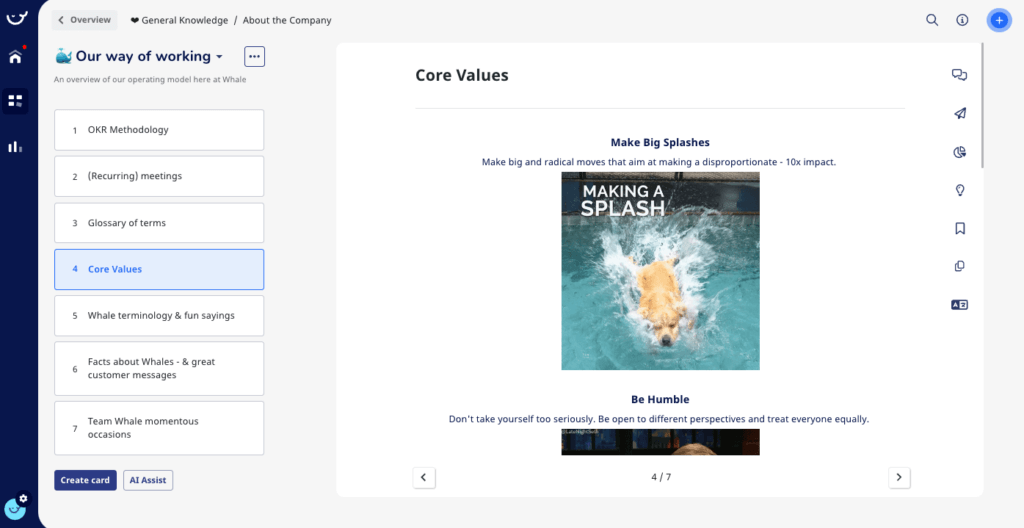Are you struggling to keep on top of all the different processes and procedures within your business? Is it becoming more and more difficult for your staff to align their tasks with the overall company goals? If this sounds like you, it might just be time to think about implementing a business playbook.
Running a business is a tough gig. With so many processes and procedures within each different team, keeping track of them and ensuring they’re adhered to properly can seem like an almost impossible task.
But it doesn’t have to be that way.
Introducing a clear, structured business playbook could just be the answer to all your problems.
Let’s take a look at what they are, how it works, and how you can create your own (in barely any time at all!)
What is a business playbook?
A business playbook contains all your company’s processes, policies, and standard operating procedures (SOPs).
It’s your winning formula!
It’s also what you follow to help you achieve your business goals and objectives—in other words, it’s a vital element to your success.
The world’s best businesses use it to ensure everything runs efficiently and effectively and to make sure everyone in the organization is on the same page.
Why you need a business playbook for growth?
There are loads of benefits to having a playbook, or set of SOPs, for your business. Not only does it help the day-to-day tasks run more smoothly, but it can also be crucial to helping you and your team navigate challenges.
And ultimately, it can give you a competitive edge.
Here are some of the most important areas where a business playbook can help:
Standardization
Playbooks establish standardized processes and procedures across every aspect of your business. This helps ensure consistency in operations, service delivery, and decision-making, reducing the risk of errors and ups and downs in performance.
Efficiency
By documenting and optimizing workflows, a playbook can also help to enhance operational efficiency. It means your employees have clear guidelines on how to perform their tasks, meaning you can all save time and increase overall productivity. Win-win!
Training and onboarding
Playbooks are great when it comes to onboarding new employees. They provide a structured guide for understanding the company’s culture, values, and operational procedures, helping new staff feel part of the team.
Decision-making
Did you know that 95% of people feel overwhelmed by data at work, and how this can affect decision making? By including guidelines for common decision points in your business, this can help employees—particularly those in management positions—to make informed and consistent decisions aligned with the company’s goals and strategies.
Scalability
A well-defined playbook is particularly beneficial if you’re looking to scale your business. It provides a framework for expansion, ensuring that new teams or branches follow the defined best practices while maintaining high standards.
Customer experience
Playbooks can include guidelines for delivering a consistent and positive customer experience—something that’s crucial for building trust, loyalty, and a strong brand reputation.
Compliance and governance
Pretty much all businesses operate within a regulatory framework, and playbooks are a great place for storing information on compliance requirements and governance policies. This helps educate your team on legal standards and industry regulations they need to adhere to.
Continuous improvement
Your playbook isn’t something that’s just written once and left to gather dust. It’s a dynamic document that can be updated and improved over time. Regular reviews and updates mean your business can quickly adapt to changing circumstances, incorporate lessons learned, and stay competitive in the market.
What should be included in your business playbook?
While it’s completely up to you what areas and guidelines you include in your business playbook, here are some of our suggestions on the key areas to think about.
💡Remember:
These are dynamic documents that should be updated and adapted as the business environment evolves. Make sure you schedule regular reviews!
Mission and vision
Clearly defined mission and vision statements that articulate the purpose and long-term goals of the business.
These are especially useful for new hires into the business—wouldn’t you want to know what your new company stands for?

Strategies and goals
An overview of the business’s strategic objectives and the specific goals it aims to achieve. This helps different teams understand the wider picture and how the work they do contributes to it.
Operational procedures
Detailed guidelines on day-to-day operations, including workflows, standard operating procedures, and best practices. Operational procedures are great for staff members at all levels, helping them to conduct their work in the most effective way.
Communication protocols
Guidelines for internal and external communication, ensuring consistency in messaging and maintaining a unified brand image. This aligns everyone in the company and ensures your business is presented in the best possible way.
Sales and marketing strategies
Detailed plans for acquiring customers, promoting products or services, and achieving sales targets. This creates consistency, not just for those in the sales and marketing teams, but throughout the company, understanding exactly what you do and your place in the market.
Customer service standards
Guidelines for delivering excellent customer service, handling inquiries, and resolving issues. After all, good customer service is vital for every business!
Financial Policies
Policies related to budgeting, financial reporting, and overall financial management. This is absolutely crucial for your finance teams to ensure they’re all aligned. There shouldn’t be any such thing as creative accounting.
Human resources policies
Guidelines for hiring, onboarding, performance management, and employee relations. This gives everyone from new hires to management a much more straightforward and manageable experience (and can help improve your retention rates!)
Risk management and compliance
Strategies for identifying and mitigating risks, as well as ensuring compliance with relevant laws and regulations. The last thing you need when there’s a problem is having no idea how to solve it!
Technology and IT policies
Guidelines for the use of technology, data security, and IT infrastructure management. This can help teams at all levels understand the tools and equipment available to them and the best ways to use them.
How to create the ultimate business playbook (in no time)?
Now that you know exactly how important these documents are for your business, you’re probably wondering where you should get started with building your own!
Here’s our handy guide, walking you through all the key steps to develop a complete playbook that align with your business goals and values 💪
And won’t take you a ton of time!
Step 1: Define your purpose and objectives
The first step is to clarify the purpose of your playbook. What do you aim to achieve with it?
Outline your business objectives and how the playbook will contribute to achieving them—this will help you write the rest of the document.
Step 2: Identify key areas to cover
Determine the core components that your playbook will address (the section above will give you some starting points if you’re not sure!)
💡 TIP – Don’t think you will need to document everything. Simply identify the key areas to cover and then choose the 20% of processes that deliver 80% of the results.
Step 3: Involve your team
Creating a playbook is a collaborative effort. Make sure you involve all your key stakeholders, department heads, and employees in the process.
You need to build your company playbook all by yourself. In fact, you definitely shouldn’t.
💡 TIP – Use subject matter experts to take ownership for their respective areas of the business.
Step 4: Document (and organize) current processes
Begin documenting existing processes and procedures within your business, being as detailed as possible while also making sure it reads clearly. This provides a baseline and helps identify areas for improvement. Don’t forget to organize! Organizing all your documentation will make it easier for your team to access the information when they need it.
💡TIP – Use tools like Whale’s AI Assist or templates to help you get started in seconds!
Step 5: Train your teams
Once your playbook is complete, communicate its existence to all employees.
Provide training sessions if necessary, and ensure that everyone understands how to use the playbook to enhance their performance and contribute to the success of the business.
💡TIP – Use Whale’s automated training flows to share your playbook when oboadinf new team members.
Step 6: Measure the impact
Arm yourself with the correct information to drive the decisions that further improve your team’s performance.
If your business playbook is your competitive edge, wouldn’t you want to keep improving?
You can only improve by measuring the impact.
Step 7: Regularly update and revise
We cannot stress enough just how important it is to keep your SOPs up-to-date. A playbook is a living document that should evolve with your business, so make sure you schedule regular reviews to update information, incorporate feedback, and adapt to changes in your industry or market.
💡TIP – You can do this automatically in Whale with revision reminders.
PS Don't forget to get feedback
Before finalizing your playbook, gather feedback from your team and encourage them to provide feedback. And make sure you actually take these into account! This ensures that the document is a collaborative and effective tool for everyone.
Mistakes to avoid in creating your playbook
Building your business playbook is an iterative process and not something you’re going to get right the first time.
We do however suggest avoiding these common mistakes;
Make sure it works for your business
Effective playbooks should be easy to use and adaptable to any organizational setting. The value increases significantly when your playbook seamlessly integrates with the tools you already use within your team, making it more likely that it will be adopted within the business. It can also help make reporting smoother and easier!
Avoid information overload
According to Gartner, 27% of employees and 38% of managers feel overwhelmed with the amount of information they’re given at work. The aim of your playbook is to HELP your employees, not add any additional stress, so make sure you filter the information down to only the most essential and useful ‘need-to-know’ items.
Make it fun
No one likes to sit and read endless documents. So make your SOPs as fun and engaging as you can, with images, charts, videos, and clear examples. This will not only make it easier for your staff to engage with the playbook, but also retain the information.
Here are some hints on how you can make the process a bit more fun!
Use technology to make it easy
We get it. Starting at the beginning of this process can seem incredibly overwhelming. But we’re going to let you in on a little secret🤫…technology is your secret weapon when it comes to documenting your business playbook. AI tools—such as the one we use at Whale—means that you can document entire processes with just a few clicks!
So there’s absolutely no excuse for not getting things started.
Struggling to get started? Start with templates
Luckily for you, the team have spent some time pulling together templates for some of the most popular and useful SOPs, including a Welcome to the Company template, a People Directory template, and a Customer Service Process template.
Looking for something else? Check out the entire Template Gallery.
Bottom line?
Adopting a business playbook in your organization isn’t just a choice but a strategic necessity to help you thrive in the marketplace. A business playbook helps align your team and can provide a roadmap for success, ensuring consistency, efficiency, and adaptability in the face of challenges.
And it can be so simple to get started! By embracing the technology available to you, you can kickstart your business and give it space to scale.
The time to elevate your operations and unleash your business’s full potential is now 🚀









